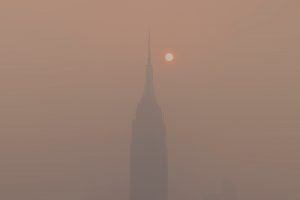
Wildfire smoke can damage your lungs, heart, eyes, nose, throat and immune system. Smoke can enter homes and contaminate indoor air. Protect yourself by staying indoors and taking steps to reduce indoor air pollution. Here are tips on how to protect the air in your home.
Why is smoke harmful?
In a wildfire, the major contributor to smoke is fine particulate matter. Of particular concern are the
smallest particles, known as PM2.5. These particles are invisible to the eye. Because they are so small, they can travel deep into the lungs and be absorbed into the body. Larger particles, called PM10, are usually visible in the form of ash. When inhaled, small bits are trapped high in the lungs and typically can be coughed out. However, they can still cause irritation.
Who is at risk?
People sensitive to wildfire smoke include:
- Children younger than 18
- Adults 65 or older
- Pregnant women
- People with chronic health conditions such as heart or lung disease, asthma or diabetes
- Anyone who is seriously ill
- Outdoor workers
- People of low socioeconomic status, including those who are homeless and those who have limited access to medical care
How does smoke enter homes?
Outdoor air can enter your home in several ways:
- Open windows and doors
- Bathroom or kitchen fans that vent to the outdoors
- Heating, ventilation and air conditioning (HVAC) systems with a fresh air intake
- Small openings, joints and cracks, including those around closed windows and doors
Improve indoor air quality
Take steps to protect the air quality in your home and stay inside.
Keep smoke out of your home
- Close windows and doors, but don’t block or tamper with
- Minimize use of exhaust fans or range hoods that don’t vent outside.
- If your window air conditioner or HVAC system has a fresh air option, turn it off or close the
Adapted from article by Glenda Hyde, Extension Family and Community Health faculty, Crook, Deschutes, Jefferson and Wheeler counties, and associate professor of practice, Oregon State University. https://extension.oregonstate.edu/catalog/pub/em-9379-protecting-indoor-air-wildfire-smoke